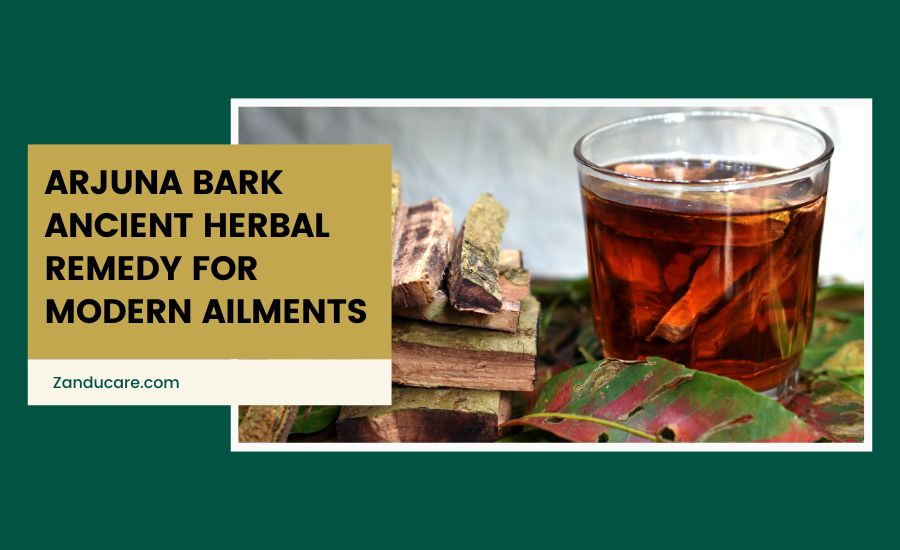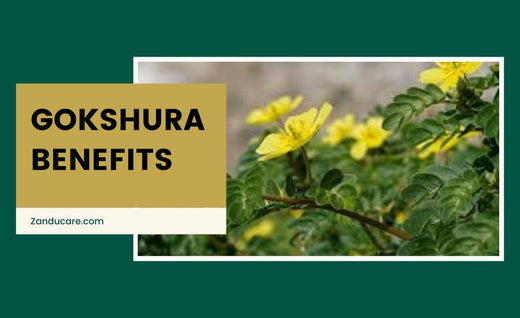
Top 19 Arjun Chaal (Bark) Benefits & Side Effects as per Ayurveda
Summary
Arjuna Chaal (Terminalia arjuna) is a powerful Ayurvedic herb known for its heart-protective benefits. It strengthens heart muscles, controls blood pressure, and helps manage cholesterol. Rich in antioxidants and essential minerals, it also supports skin health, reduces stress, treats UTIs, diarrhoea, acne, and bronchitis. Its cooling, astringent nature balances Pitta and Kapha doshas. Typically taken as a powder with milk/water or as tea, it is safe for most but should be used with caution during pregnancy or with heart medications. Arjuna is a natural, effective remedy for heart and overall wellness.
In Ayurveda, the Arjun tree, or Terminalia arjuna, is renowned for its numerous health and skincare advantages. The bark of this tree is the primary medicinal ingredient utilised for therapeutic purposes. Arjuna powder is recognised for its cardioprotective properties, in addition to its advantages for a variety of skin conditions. T. arjuna has a variety of therapeutic benefits, including effects on the digestive system, anti-carcinogenic, anti-inflammatory, hypotensive, anti-atherogenic, and antioxidant properties.
Arjuna is also rich in many other nutrients, including gallates, Arjungenin, Arjunolic acid, polyphenols, and other essential minerals for heart health, like potassium. Its cardio-tonic qualities, which aid in fortifying the heart muscles, are thoroughly explained and detailed in the age-old science of Ayurveda.
Did you know?
- In Ayurveda, the Arjun tree, or Terminalia arjuna, is renowned for its numerous health and skincare advantages.
- T. arjuna Chaal has a variety of therapeutic benefits, including effects on the digestive system, anti-carcinogenic, anti-inflammatory, hypotensive, anti-atherogenic, and antioxidant properties.
- Its cardio-tonic qualities, which aid in fortifying the heart muscles, are thoroughly explained and detailed in the age-old science of Ayurveda.
- Because arjuna paste has anti-inflammatory qualities, it helps control acne and pimples by lowering inflammation.
7 Benefits of Consuming Arjun Chaal/Bark

Below are the benefits of Arjuna Bark for health:
1. Relieves chest pain
Arjuna helps lower the risk of angina and other cardiac issues. While the discomfort associated with angina is a sign of an exacerbated Vata, the angina itself is caused by an inflamed Kapha. An inflamed Kapha produces ama, or toxic residue, in the body from incorrect digestion.
Ama builds up in the cardiac channels, causing an obstruction that exacerbates the Vata. This hurts in the chest area. Arjuna can balance the Kapha. It eases the agitated Vata, clears the obstruction of the heart passages, and reduces Ama, lessening discomfort in the chest.
2. Arjuna for Pigmentation
According to Ayurveda, heat, sun exposure, hormonal imbalances, and an inflamed Pitta dosha in the body are all linked to hyperpigmentation. Because arjuna bark balances the pitta, it helps to reduce tanning and pigmentation.
Make an anti-pigmentation mask combining 2-3 grams of wild turmeric with 1 tsp of fresh Arjuna bark powder and milk. After applying this evenly to the face and neck for five to ten minutes, rinse it with regular water. You can use this anti-pigmentation mask one to three times every week.
Moreover, black spots and pigmentation can be reduced by applying a mixture of honey, powdered arjuna bark, and Manjistha (Rubia Cordifolia) root to the face.
3. Arjuna for Diarrhoea
In Ayurveda, diarrhoea is referred to as Atisar. Inappropriate diet, tainted water, pollutants, mental strain, and Agnimandya (weak digestive fire) are the causes. These aggravate Vata, which transports fluid from different bodily tissues into the gut, mixing it with stool.
Diarrhoea or loose, watery movements result from this. Taking Arjuna Chaal, or bark, aids in maintaining bodily fluid balance and controlling movement frequency. Its Sita (cool) and Kashaya (astringent) qualities account for this.
4. Arjuna for Urinary tract infections (UTIs)

In Ayurveda, a urinary tract infection is referred to by the general word Mutrakcchra. Krichra means painful, and Mutra implies oozing. Thus, the term "Mutrakcchra" refers to dysuria and painful urination. When a urinary tract infection is present, taking Arjuna products can help to relieve the pain and improve urine flow. It's mutral (diuretic characteristic is the cause of this. Because of its Sita (cold) nature, it also lessens the burning feeling and provides a cooling effect during urination.
5. Arjuna for acne and breakouts
Because arjuna paste has anti-inflammatory qualities, it helps control acne and pimples by lowering inflammation. Additionally, it contains astringent qualities that cause skin cells to shrink and aid in reducing acne, which is brought on by the skin producing too much oil.
One can evenly apply a mixture of honey and fresh Arjuna bark paste to the face and leave it on for four to five minutes. Then, use regular water to rinse it off. This treatment for pimples and acne can be used two to three times a week.
6. Arjuna for inflammation of the airways (bronchitis)
Arjuna helps treat lung conditions such as bronchitis, asthma, coughing, and infections. Poor digestion is the root cause of lung issues like bronchitis, which Ayurveda refers to as Kasroga. Ama results from an inadequate diet and insufficient waste removal from the body. Ama is the toxic residue left behind by incorrect digestion.
Bronchitis results from this Ama building up in the lungs as mucus. Because Arjuna balances the kappa, it helps to minimise Ama and clear mucus.
7. Reduces stress

Arjuna's adaptogenic qualities aid the body in adjusting and managing stress. Stress and anxiety can be better managed thanks to its relaxing influence on the nervous system. Since long-term stress can aggravate heart-related conditions, Arjuna indirectly helps cardiovascular health by encouraging relaxation.
8. Relieves Menstrual Problems
Arjuna bark has been traditionally used in Ayurveda to regulate the menstrual cycle. It helps ease abdominal cramps, reduce heavy bleeding, and balance hormonal fluctuations naturally. Its astringent and cooling properties make it especially beneficial for women suffering from irregular or painful periods.
9. Prevents Hairfall
Rich in essential minerals and antioxidants, Arjun ki chaal helps nourish the scalp, strengthen hair follicles, and prevent hair fall. Regular use, whether internally or in oil formulations, can improve hair texture and reduce hair thinning caused by stress, hormonal imbalances, or nutritional deficiencies.
10. Anti-Ageing Properties
Loaded with antioxidants like flavonoids and tannins, Arjuna bark helps neutralise free radicals responsible for ageing. It protects skin cells from oxidative stress, supports collagen production, and helps maintain skin elasticity, making it a natural remedy for youthful and glowing skin.
11. Relieves Migraines
Its natural cooling and nervine tonic properties help calm the nervous system, which can be useful in managing stress-induced headaches or migraines. Arjun bark may help reduce the intensity and frequency of migraine episodes when taken consistently under guidance.
12. Treatment of Gout
Gout is caused by an excess of uric acid in the body. Arjuna bark promotes the elimination of toxins and supports kidney function, which helps in reducing uric acid buildup in the joints. Its anti-inflammatory action also helps relieve the pain and swelling associated with gout.
13. Helps with Indigestion
Known for its digestive benefits, Arjuna bark helps in managing hyperacidity, bloating, and loss of appetite. It enhances the secretion of digestive enzymes and supports better nutrient absorption, thereby promoting a healthier gut.
14. Treatment of Osteoporosis and Arthritis
The calcium and other bone-strengthening minerals in Arjuna bark make it effective in managing osteoporosis and arthritis. It improves bone density, reduces joint inflammation, and provides relief from stiffness and pain, especially in ageing individuals.
15. Remedy for Skin Problems
Arjuna bark purifies the blood and eliminates toxins from the body, helping treat acne, rashes, and other chronic skin issues. It also has antimicrobial properties that protect the skin from infections and support faster wound healing.
16. Lowers Cholesterol
Studies have shown that Arjuna bark helps lower LDL (bad) cholesterol and triglycerides while maintaining HDL (good) cholesterol. This action is beneficial for preventing atherosclerosis, high blood pressure, and other heart-related issues.
17. Helps in Weight Loss
By improving digestion and metabolism, Arjuna bark assists in burning fat more efficiently. It also supports liver function and helps detoxify the body, making it a natural aid for weight management when combined with a healthy diet and exercise.
18. Boosts Immunity
Arjun bark strengthens the immune system by improving the body's ability to fight infections and inflammation. Its antioxidant content also protects the body from harmful toxins and environmental stressors, contributing to overall wellness.
19. Helps with Cold and Cough
It acts as a natural expectorant and helps in clearing the respiratory passages. Arjuna bark reduces throat irritation, soothes coughs, and aids in treating conditions like bronchitis, asthma, and seasonal colds.
Nutritional Profile of Arjuna Chaal
| Nutrient/Component | Details / Benefits |
|---|---|
| Tannins | Astringent, antioxidant, supports heart and skin health |
| Flavonoids | Anti-inflammatory, cardioprotective |
| Saponins | Help reduce cholesterol and blood pressure |
| Glycosides | Strengthen heart muscles |
| Minerals | Calcium, Magnesium, Zinc – support bone and heart health |
| Coenzyme Q-10 (like effect) | Boosts heart energy and performance |
| Arjunolic acid | Antioxidant, anti-inflammatory, and antimicrobial |
| Ellagic acid | Antioxidants may help detoxify and protect cells |
What is the Effect of Arjuna on Doshas?
Arjuna has an astringent flavour that is characteristic of Kashaya Rasa, making it a helpful natural medicine for various cardiac problems and improving heart health. Arjuna extracts are light in texture and quickly absorbed by the body. They also have a favourable Rooksha Guna, meaning dry quality, and a Katu Vipaka, which suggests a strong acerbic flavour when digested in the system.
With a Sheeta Veerya or cold potency, Arjuna is highly regarded for its Hridaya Prabhava, or excellent benefits for enhancing heart health and effectively balancing the Pitta and Kapha doshas, which preserves tridoshic equilibrium.
Side Effects of Arjuna Chaal/Bark
- Digestive Issues: Some people experience digestive problems like nausea, stomach upset, or diarrhoea when they consume Arjuna bark. These symptoms are usually mild but can cause discomfort.
- Allergic Reactions: Arjuna bark can cause allergic reactions in some individuals. Symptoms may include skin rashes, itching, or swelling. If you notice any signs of an allergy, stop using Arjuna immediately and consult a doctor.
- Low Blood Pressure: Arjuna bark can lower blood pressure, which benefits those with hypertension. However, if you already have low blood pressure or are taking medications that lower blood pressure, using Arjuna can cause dizziness, lightheadedness, or fainting.
- Interactions with Medications: Arjuna bark can interact with certain medications, particularly those used for heart conditions and blood pressure. If you are on medication, consult your doctor before using Arjuna to avoid potential adverse effects.
- Pregnancy and Breastfeeding: The safety of Arjuna bark during pregnancy and breastfeeding is not well-established. Pregnant or breastfeeding women should avoid using Arjuna without medical advice to prevent any possible risks to themselves and their babies.
Conclusion
Arjuna bark is a remarkable natural remedy, especially for heart health. Its centuries-old use in Ayurvedic medicine highlights its effectiveness and reliability. By incorporating Arjuna bark into your routine, you can harness its powerful benefits, such as improving cardiovascular function, reducing blood pressure, and enhancing overall well-being.
Imagine having a simple, natural supplement that supports your heart, allowing you to lead a healthier, more energetic life. With Arjuna Bark, you can take a proactive step towards maintaining a solid and resilient heart. So why not give it a try? Embrace the healing power of nature and discover how Arjuna bark can be your heart’s best friend. Always consult with a healthcare professional to ensure it fits your health needs.
FAQs
1. What is Arjuna bark good for?
Because of its cardioprotective qualities, arjuna bark powder keeps the heart safe. It fortifies the heart's muscles, aiding in its healthy operation. Additionally, it possesses anti-hypertensive properties that help lower excessive blood pressure levels. Arjuna is a well-known plant that helps regulate heart functioning.
2. Can Arjuna remove the heart blockage?
The bark of the Arjuna tree has long been thought to promote heart health and preserve the body's circulatory system. It also reduces the risk of heart failure and helps to manage blood pressure. Ayurveda advises Arjun ki Chaal to prevent heart blockage by controlling cholesterol levels.
3. What are the disadvantages of Arjun Chaal?
The moderate adverse effects of arjuna consumption include headache, nausea, gastritis, and body aches. The essential ingredient of Arjunarishta, arjuna plant extract, can cause hypothyroidism and hepatotoxicity when used.
4. How much Arjun Chaal per day?
For optimal effects, use one teaspoon of Arjun ki Chaal powder in a glass of milk or water twice daily after meals. If you have other health-related concerns, please speak with your physician before using this product.
5. Can we boil Arjun Chaal in water?
You can make herbal tea that tastes like Arjun ki Chaal by boiling the bark in water. The benefits of Arjun tea include blood sugar regulation, cardiovascular support, and anti-inflammatory qualities.
6. What are the benefits of Arjun Chaal?
Supports heart health, lowers cholesterol, controls blood pressure, boosts immunity, aids in weight loss, and improves liver and skin health.
7. Is Arjun Chaal a side effect?
No, it’s not a side effect. But overuse may cause constipation or low blood pressure.
8. Can you take Arjuna every day?
Yes, it’s safe to take daily in recommended doses.
9. Does Arjuna reduce blockage?
Yes, it helps reduce artery blockages by lowering bad cholesterol and improving circulation.
10. How long does Arjun Ki Chaal take to work?
2–4 weeks for basic benefits; 2–3 months for heart-related improvements.
11. Is Arjuna good for fatty liver?
Yes, it helps detox the liver and reduces fat accumulation.
12. Does Arjuna cause constipation?
Yes, in some people. Drink plenty of water or mix with milk.
13. How to drink Arjun Chaal?
Boil 1 tsp bark in 2 cups of water, reduce to half. Drink once or twice daily.
14. Is Arjuna bad for the kidneys?
No, it’s safe for the kidneys when taken in proper doses.
15. Can we drink Arjuna tea on an empty stomach?
Yes, but people with acidity may prefer it after meals.
References
- In Ayurveda, the Arjun tree, or Terminalia arjuna, is renowned for its numerous health and skincare advantages. (https://www.ncbi.nlm.nih.gov/)
- T. arjuna has a variety of therapeutic benefits, including effects on the digestive system, anti-carcinogenic, anti-inflammatory, hypotensive, anti-atherogenic, and antioxidant properties. (https://www.ncbi.nlm.nih.gov/)
- Its cardio-tonic qualities, which aid in fortifying the heart muscles, are thoroughly explained and detailed in the age-old science of Ayurveda. (https://www.sciencedirect.com/)
- Because arjuna paste has anti-inflammatory qualities, it helps control acne and pimples by lowering inflammation. (https://www.researchgate.net/)






Leave a comment
This site is protected by hCaptcha and the hCaptcha Privacy Policy and Terms of Service apply.